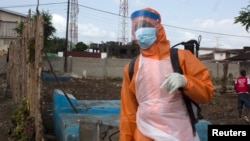The Ebola virus continues to ravage Sierra Leone despite ongoing efforts by the government and international community to contain it. The country’s president has made the virus a top priority on his agenda, scaling down other projects that were to be implemented. He has also committed over $20 million (US) to fight the disease.
The international humanitarian organization ActionAid says it has been on the ground training volunteers to spread awareness of the disease and how to stop it from spreading.
ActionAid country director in Sierra Leone, Mohamed Silah says the Ebola crisis persists with the highest count of new cases reported to date in November.
“It was over 1,400 in just the month of November, and that was the highest in just a single month. Every day the numbers are increasing. There is no positive trend to see the numbers are decreasing,” explained Silah.
Even with the additional treatment facilities, labs, and the support of the international community, the virus continues to spread in major towns.
“Actually we have lost seven doctors, and even this week…two doctors have gotten infected. One is an Italian and, another one, a national is in the country and is being treated. So this is a very, very huge task for the health personnel,” said Silah. (As of December 10, 2014, 10 of the 11 Sierra Leonean doctors who have contracted the Ebola virus have died.)
Silah also highlighted one of the key challenges health and humanitarian workers are facing is there are not enough laboratories in all of the districts, and the virus has spread to all districts of Sierra Leone. The shortage of labs is causing a delay in diagnosing Ebola and in treating the patient.
“Secondly we do not have enough bed space to accommodate all of the sick people that are currently showing signs and symptoms. That’s another big challenge. And thirdly, because a lot more people are picking up the disease, we need to quarantine a lot of houses. There are many houses where Ebola victims have been picked up—that have not been quarantined because we don’t have enough security deployed to such places,” Silah pointed out.
In addition he said people who have been quarantined in their home, may leave their home in search of food, spreading the virus.
“There are limited supplies of food. People who leave their houses—they will move out of being isolated eventually because they are not being provided with food.”
Silah highlighted that people’s attitudes still have not changed regarding following safety precautions to reduce the chance of contracting the Ebola virus.
“We still have the challenge of people hiding sick people within their houses. There was even a very bad scenario… when people had to go and exhume a dead Ebola body because they said they had to perform special traditional rights on the corpse. And that was even being championed by a local chief!”
Silah said the social mobilization of people, getting them to follow direction to avoid contamination is still a big challenge.
“Ideally even with all the hospitals, and with all the facilities, if people don’t change their attitudes, we cannot easily get rid of the disease,” he emphasized.




